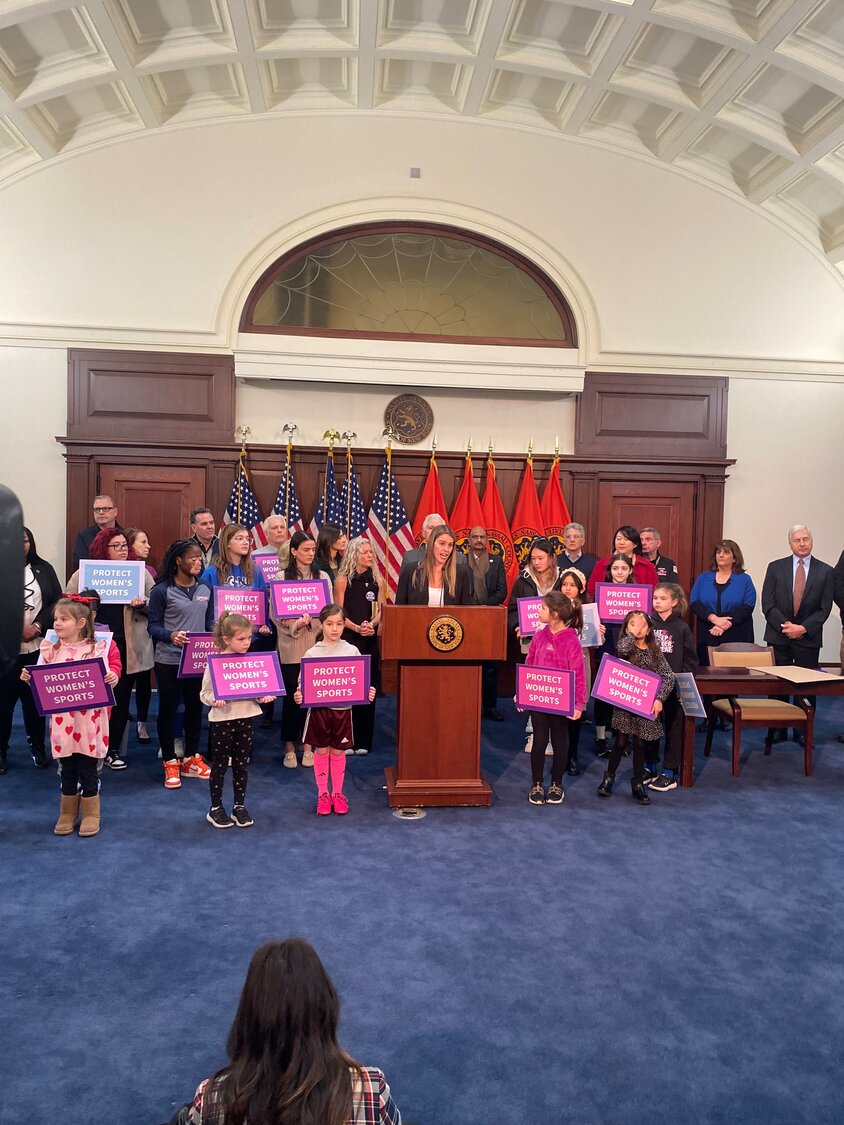Nassau County takes aim at some trans athletes
Thanks to Nassau County Executive Bruce Blakeman’s first executive order of the year, the county is gaining new attention as it becomes the newest battlefield of the United States’ culture wars.
Blakeman’s executive order banning transgender women from participating in sports on any property operated by the county Department of Parks, Recreations and Museum has given rise to a lawsuit from the state attorney general’s office as well as outrage from numerous LGBTQ and civil rights groups, and divided the opinions of county residents.
Eva Frosh, of Oyster Bay, said that she was angered by the news of Blakeman’s order. She added that while she doesn’t have any family members who are transgender, she felt that the order was an unnecessary attack on the transgender community.
“I feel no politician should judge a person on how they feel and how they would want to appear,” Frosh said. “It’s not our business, it’s the business of the people that feel that way.”
Samantha Goetz, a Republican county legislator whose District 18 includes Glen Head, parts of Glenwood Landing and Oyster Bay, was with Blakeman on Feb. 22 when he signed the order. In a subsequent interview, Goetz reflected on her memories of playing high school basketball, and defended the action as a way to protect and provide equal opportunities for athletes born biologically female.
She argued that women had physical disadvantages compared with men, and that she never would have enjoyed her athletic career if she had competed against men. Goetz also asserted that the goal of the ban was to protect female athletes, not to discriminate against transgender ones.
“Males playing on female sports teams have inherent advantages over females,” Goetz said. “So I think by the county executive’s order, we’re getting ahead of this growing trend, where we’re seeing biological males competing on the national news.”
David Sarles, a Bayville resident and a former teacher and coach, said that while he did not have any transgender athletes on his teams when he coached wrestling and cross-country at Portledge School and other private schools around Long Island, he has followed the conversation in the national news for over a decade. He said he supported transgender athletes playing on whatever team made them feel most comfortable.
“I would welcome a member of any gender to my team,” Sarles said. “As an athlete, I loved to compete with any athlete who wanted to line up at the starting line of any race.”
The executive order does not prevent transgender men, or people assigned the female gender at birth who now identify as male, from competing in men’s sports. Frosh said she thought the decision seemed sexist, with the implication being that no biological woman could have an impact in those sports.
Blakeman has emphasized that the goal of the order is not to penalize transgender athletes, but to ensure equity for those who are biologically female.
“This is not precluding anybody from participating in sports,” he wrote in a statement. “What it is, is identifying that there are women and girls who spent a tremendous amount of time and effort to excel and compete in their sports that are women’s sports — whether it’s WNBA, whether it’s college, whether it’s high school, whether it’s just a community league — and it is an unfair advantage for someone who’s a biological male to compete against a biological female.”
Blakeman wrote that gender is defined as an individual’s biological sex at birth.
Attorney General Letitia James demanded that Blakeman rescind the ban, saying that it was a “discriminatory and transphobic executive order,” according to a news release on March 2.
James termed the order a “clear violation” of state civil and human rights law that would subject all female athletes to “intrusive and invasive questioning.”
Sarah Kate Ellis, president and CEO of the Gay and Lesbian Alliance Against Defamation, said in a statement that the order does nothing to help youth who live and play in Nassau County or to keep them safe.
“Transgender youth want the opportunity to play sports for the same reason all youth do: to be a part of a team where they belong,” Ellis said. “Excluding girls from playing sports with their friends, simply because they are transgender, sends a dangerous message to young people: that it is okay to exclude people simply because you do not understand them.”
Additional reporting by Roksana Amid and Parker Schug.

 44.0°,
Mostly Cloudy
44.0°,
Mostly Cloudy 





